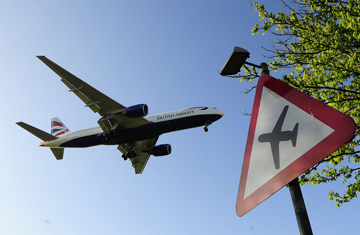
A British Airways jet lands at Heathrow Airport in London on April 21, 2010
Turn to any British news channel for most of Tuesday, and the reports were all the same: hopes were fading for a plan to gradually open U.K. airspace as the volcano under Iceland's Eyjafjalla Glacier belched a second enormous cloud of ash and dust toward the British Isles. Then, suddenly, the government announced that it would reopen all U.K. airports at 10 p.m. GMT. What, many in Britain asked, just happened?
The fact that mere minutes after 10 p.m. there were already flights touching down at Heathrow Airport should have been a clue. On Tuesday morning, British Airways CEO Willie Walsh, reportedly infuriated that the government had given German carrier Lufthansa the right to fly over U.K. airspace as long as the planes cleared 20,000 feet — their vapor trails tauntingly visible to those on the ground — quietly ordered more than two dozen long-haul flights to head for London. Airplane enthusiasts remarked online early Tuesday evening at the mounting number of British Airways aircraft that could be seen on tracking websites circling the fringe of U.K. airspace. Walsh, British media outlets later speculated, had been playing chicken with the government, daring it to divert the jumbo jets crammed with hundreds of weary travelers, many of whom had been trying to get home for nearly a week.
If it was a game of chicken — and the Civil Aviation Authority (CAA) and British Airways differ in their accounts of the events — the government swerved, and nearly all 26 British Airways flights made it in, with only a few diverted to the European mainland, where buses would chauffeur the travelers home. The CAA tells TIME that those flights were nothing unusual, pointing out that British Airways had been routing planes to the U.K. and diverting them when they couldn't land for several days. Not so, says British Airways spokeswoman Sophie Greenyer: "Yesterday was the first time we departed long-haul aircraft."
Meanwhile, Transportation Secretary Lord Andrew Adonis was quick to deny that the abrupt opening of the airports had anything to do with mounting anger from airlines that were losing hundreds of millions of dollars a day. "At every stage, decisions were based on the decisions of safety regulators," Adonis told reporters on Tuesday night. "They have not been based on pressure from the airlines, and that is what the public would expect."
Still, Walsh remained defiant, saying on Tuesday evening, "I don't believe it was necessary to impose a blanket ban on all U.K. airspace last Thursday." His bold criticism of the Labour Party's handling of the travel crisis — and the resulting demands by airlines of remuneration — came as British Prime Minister Gordon Brown was trying to claim steady leadership throughout the emergency, having sent Royal Navy ships across Europe to rescue stranded Britons, ahead of the May 6 election.
Born in Dublin, Walsh began his airline career as a trainee pilot at the age of 17. He rose through the ranks, eventually heading the Irish Airline Pilots Association, in which capacity, he once remarked, "a reasonable man gets nowhere in negotiations." Indeed, his self-described business style is "brutally honest" and he tends to act first and apologize later. Such pugnacity won him successful tenures at the helms of Spain's Futura airline and then Ireland's Aer Lingus, which he took over just after 9/11. He helped stem Aer Lingus' bloodletting of $3 million a day by remorselessly chopping a third of its workforce, selling noncore assets — including the company's art collection — and reconfiguring the airline into a bargain flyer along the lines of Virgin America and Jet Blue. Within three years, Walsh had Aer Lingus back in the black, turning it into the most profitable state-run airline in the Western world.
As CEO of British Airways for the past five years, Walsh has learned how to deal with p.r. catastrophes. He successfully navigated the company's disastrous opening of Heathrow's Terminal 5 in 2008, when logistical problems forced hundreds of flight cancellations and tens of thousands of bags went missing. And, to the acute embarrassment of the Labour Party, in recent months Walsh has taken on the airline's largest union, Unite, a major Labour donor. From the very beginning of the current travel crisis, Walsh has said the government has been overreacting, going so far as to personally board a test flight to demonstrate the durability of his aircraft.
Many are crediting Walsh with ending the travel debacle. Whether that is true or not, British Airways, despite losing millions of dollars, has clearly gotten a p.r. boost from the affair — having shown the lengths to which it will go to get Britons home.
— With reporting by Eben Harrell and Catherine Mayer / London
